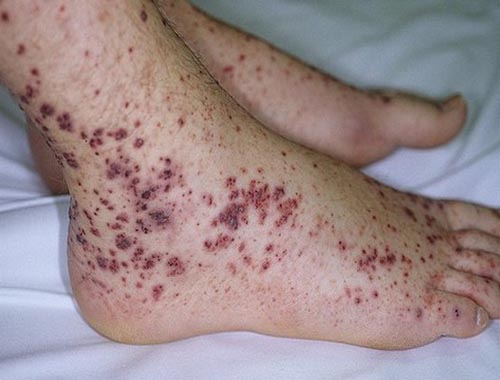Vasculitis, Angiitis, Arteritis
Vasculitis refers to a rare group of conditions characterized by inflammation of blood vessels. It occurs when the immune system attacks a person's own blood vessels. The cause of vasculitis is often unknown. In the absence of an identifiable cause, it is called primary vasculitis. When an underlying cause can be identified, it is called secondary vasculitis. Secondary vasculitis may be triggered by an allergic reaction to a medication, in response to an infection such as hepatitis C, or as a result of an autoimmune disease, such as rheumatoid arthritis. In some cases, secondary vasculitis is seen as a complication of blood cell cancers such as leukemia and lymphoma. Vasculitis can affect any of the body's blood vessels. These include arteries, veins, and capillaries. Arteries carry blood from your heart to your body's organs. Veins carry blood from your organs and limbs back to your heart. Capillaries connect the small arteries and veins. If a blood vessel is inflamed, it can narrow or close off. This limits or prevents blood flow through the vessel. Rarely, the blood vessel will stretch and weaken, causing it to bulge. This bulge is known as an aneurysm. Because vasculitis is a systemic illness, symptoms can be non-specific and include those typical of inflammation: Fatigue; Loss of appetite; Weight loss; Fever; Body aches. These symptoms may appear rapidly or may develop gradually over the course of several months. The presentation of symptoms can vary considerably from person to person. In addition to these diffuse symptoms, someone can have organ-specific, localized symptoms associated with the particular type of vasculitis they have. The size and specific blood vessels that are affected often lead to a characteristic set of symptoms for each type. Some types of vasculitis: Behcet's Disease; Giant Cell Arteritis (GCA); Polymyalgia Rheumatica; Takayasu's Arteritis; Buerger's Disease; Central Nervous System Vasculitis; Kawasaki Disease; Polyarteritis Nodosa; Churg-Strauss Syndrome; Henoch-Sch�nlein Purpura; Essential Mixed Cryoglobulinemia; Microscopic Polyangiitis; Wegener's Granulomatosis.
